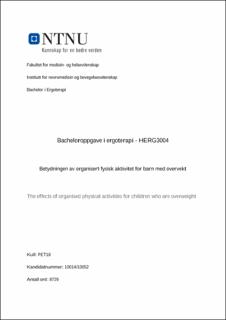| dc.contributor.advisor | Eik-Nes, Trine Tetlie | |
| dc.contributor.author | Sagård, Vilde | |
| dc.contributor.author | Tandberg, Gro-Eli | |
| dc.date.accessioned | 2021-09-25T16:31:31Z | |
| dc.date.available | 2021-09-25T16:31:31Z | |
| dc.date.issued | 2021 | |
| dc.identifier | no.ntnu:inspera:82578383:84892027 | |
| dc.identifier.uri | https://hdl.handle.net/11250/2783253 | |
| dc.description.abstract | Sammendrag
Tittel: Betydningen av organisert fysisk aktivitet for barn med overvekt.
Formål: Overvekt blant barn er et økende problem i dagens samfunn. Dette, i sammenheng med psykososiale og sosioøkonomiske faktorer, kan være med på å hemme deltagelse i organiserte fysiske aktiviteter. Hensikten med oppgaven er å undersøke nærmere hvordan organisert fysisk aktivitet påvirker livskvaliteten til barn med overvekt i barneskolealder.
Metode: Det har blitt gjennomført et scoping review for å identifisere, analysere og sortere litteratur og funn til temaet. I tillegg har det blitt benyttet relevant litteratur og teori for å belyse problemstillingen.
Resultat: Funn fra artikler i litteratursøk viser at organisert fysisk aktivitet har en positiv sammenheng med livskvaliteten til barn med overvekt i barneskolealder. Det kommer også frem at organiserte fysiske aktiviteter har en positiv innvirkning på både sosiale og psykososiale faktorer som fremmer livskvaliteten. På bakgrunn av dette kan barn få følelse av kontroll, økt motivasjon og bedre selvfølelse.
Konklusjon: Organisert fysisk aktivitet er med på å øke livskvaliteten til barn med overvekt.
Nøkkelord: Barn, overvekt, organisert fysisk aktivitet, livskvalitet. | |
| dc.description.abstract | Abstract
Title: The effects of organised physical activities for children who are overweight.
Purpose: Overweight among children is a growing problem in todays ́s society. This, in connection with psychosocial and socio-economic factors, can inhibit participation in organised physical activities. The purpose of this study is to investigate further how organised physical activity affects the quality of life of children with overweight in primary school age.
Method: A scoping review has been conducted to identify, analyze and sort literature and findings in the topic. In addition, relevant litterature and theory have been used to shed light on the topic question.
Result: Findings from articles in literature search show that organised physical activity has a positive correlation with the quality of life of children with overweight of primary school age. It also appears that orginsed physical activity have a positive impact on both social and physchosocial factors that promote quality of life. Based on this, children can gain a sense of control, increased motivation and better selfesteem.
Conclusion: Orginased physical activity helps to increase the quality of life of children with overweight.
Keywords: Children, overweight, organised physical activity, quality of life | |
| dc.language | nob | |
| dc.publisher | NTNU | |
| dc.title | Betydningen av organisert fysisk aktivitet for barn med overvekt | |
| dc.type | Bachelor thesis | |
